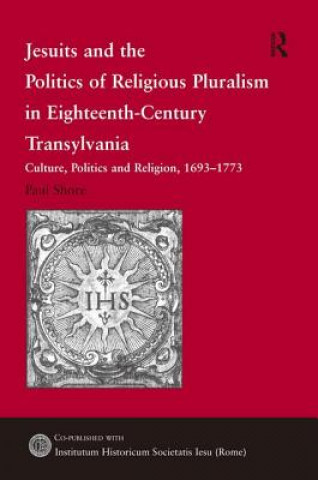
Kód: 04680333
Jesuits and the Politics of Religious Pluralism in Eighteenth-Century Transylvania
Autor Paul Shore
This book tells the story of the Jesuit mission to Cluj, Transylvania (now Romania) from 1693, when the Jesuits were allowed to return after almost a century of restricted activity in the region, until 1773, when the order was sup ... celý popis
- Jazyk:
 Angličtina
Angličtina - Vazba: Pevná
- Počet stran: 246
Nakladatelství: Taylor & Francis Ltd, 2007
- Více informací o knize

Mohlo by se vám také líbit
-

Houdini On the Spot
1162 Kč -

Cave, The
523 Kč -

Streetwise
494 Kč -

Wittgenstein's Form of Life
7223 Kč -

Water Margin
219 Kč -

Guidance for the National Healthcare Disparities Report
1838 Kč -

Evaluation Methodology Basics
3145 Kč -

Health, Illness and Use of Care
6459 Kč -

Food, Culture, and Survival in an African City
1681 Kč -

Millikan and Her Critics
3447 Kč -

International Students and Academic Libraries
3211 Kč -

Sensual Massage for Couples
554 Kč -

Polymeric Foams and Foam Technology
8066 Kč -

Z deníku ajťáka
206 Kč
Dárkový poukaz: Radost zaručena
- Darujte poukaz v libovolné hodnotě a my se postaráme o zbytek.
- Poukaz se vztahuje na celou naši nabídku.
- Elektronický poukaz vytisknete z e-mailu a můžete ihned darovat.
- Platnost poukazu je 12 měsíců od data vystavení.
Více informací o knize Jesuits and the Politics of Religious Pluralism in Eighteenth-Century Transylvania
Nákupem získáte 608 bodů
 Anotace knihy
Anotace knihy
This book tells the story of the Jesuit mission to Cluj, Transylvania (now Romania) from 1693, when the Jesuits were allowed to return after almost a century of restricted activity in the region, until 1773, when the order was suppressed. During these eight decades, the Jesuits created a complex, multi-faceted community whose impact reached throughout Transylvania and beyond into neighbouring regions. In addition to an ongoing missionary program in this predominantly non-Catholic region, the Jesuits established a cluster of schools and a university that trained the elite, introduced Baroque architecture, music and literature, and became the masters of extensive properties. The Jesuits' schools staged dramas in several languages, their printing press produced a wide range of publications, including a Hungarian 'ABC for Girls' and a catechism in Ukrainian, and Jesuit scientists, including Miksa Hell, later Court Astronomer in Vienna, conducted experiments and observations. Among the unique features of this study are the accounts of how Jesuits sought to impose social conformity on the ethnically and religiously diverse community, the Jesuits' project to develop a 'Uniate Church' that would retain the Eastern Rite while acknowledging the authority of Rome, and the story of the long-forgotten Jesuit 'brothers', who contributed their talents as craftsmen and artists to the Jesuit enterprise. A chapter is devoted to the ill-fated 1743 mission to Moldavia, in which Transylvanian Jesuits hoped to establish a missionary and educational outpost in this Ottoman-dominated principality. Special attention is given to Jesuit interactions with the many minority groups present in Cluj: Armenians, Jews, Roma (Gypsies), and German speaking 'Saxons', as well as encounters with ethnic Romanians, who made up the majority of the population of Transylvania and among whom the Uniate Church was promoted. Cluj, a city where the cultures of Eastern and Western Europe meet, represented the furthermost penetration into Orthodox Europe of the Baroque aesthetic and of the domination of the Habsburgs, supported and glorified by the Jesuits. The successes and failures of this religious order helped shape the history of the region for the next two centuries.
 Parametry knihy
Parametry knihy
Zařazení knihy Knihy v angličtině Humanities Religion & beliefs Christianity
6077 Kč
- Plný název: Jesuits and the Politics of Religious Pluralism in Eighteenth-Century Transylvania
- Autor: Paul Shore
- Jazyk:
 Angličtina
Angličtina - Vazba: Pevná
- Počet stran: 246
- EAN: 9780754657644
- ISBN: 0754657647
- ID: 04680333
- Nakladatelství: Taylor & Francis Ltd
- Hmotnost: 522 g
- Rozměry: 234 × 156 × 16 mm
- Datum vydání: 28. June 2007
Oblíbené z jiného soudku
-

The Holy Bible - King James Version
254 Kč -

Orthodox Study Bible, Hardcover
1148 Kč -

Prayer Book
765 Kč -

Yoga of Jesus
306 Kč -

NRSV, Catholic Bible, Gift Edition, Leathersoft, White, Comfort Print
716 Kč -

KJV Holy Bible, Personal Size Giant Print Reference Bible, Burgundy Leather-Look, 43,000 Cross References, Red Letter, Comfort Print: King James Versi
431 Kč -

Jesus Calling, Pink Leathersoft, with Scripture References
417 Kč -

Feeling is the Secret
171 Kč -

KJV, Value Thinline Bible, Compact, Leathersoft, Brown, Red Letter, Comfort Print
343 Kč -

KJV, Holy Bible, Larger Print, Paperback, Comfort Print
176 Kč -

Holy Bible
611 Kč -

Second Coming of Christ
1482 Kč -

Book of Enoch
219 Kč -

NKJV, Lighting the Way Home Family Bible, Hardcover, Red Letter Edition
1148 Kč -

Practice and Presence of God
188 Kč -

HOLY BIBLE: King James Version (KJV) White Compact Christening Edition
464 Kč -

Secrets of a Prayer Warrior
235 Kč -

Disciplines of a Godly Man
383 Kč -

Message Deluxe Gift Bible, Brown
374 Kč -

Give Me an Answer
523 Kč -

Luther Bible of 1534
1338 Kč -

O Death, Where is Thy Sting?
299 Kč -

Case for Christ
213 Kč -

NRSV, Catholic Bible, Gift Edition, Leathersoft, Teal, Comfort Print
686 Kč -

Jesus Calling, Large Text Brown Leathersoft, with Full Scriptures
634 Kč -

How We Love: Discover your Love Style, Enhance your Marriage (Expanded Edition)
401 Kč -

Reason for God
306 Kč -

NKJV, Checkbook Bible, Compact, Bonded Leather, Black, Wallet Style, Red Letter
702 Kč -

KJV Economy Bible
165 Kč -

Bible: Authorized King James Version
380 Kč -

NLT Premium Gift Bible, Purple
448 Kč -

Angels
457 Kč -

CSB Compact Bible, Brown LeatherTouch, Value Edition
320 Kč -

Crime and Punishment
484 Kč -

Confessions
237 Kč -

Hillbilly Volume 2
429 Kč -

Embraced
478 Kč -

Exegetical Fallacies
455 Kč -

Christian Apologetics
371 Kč -

Foundation Study Bible-KJV
702 Kč -

Supernatural
375 Kč -

NLT One Year Chronological Bible, The
446 Kč -

ESV Vest Pocket New Testament with Psalms and Proverbs
222 Kč -

Real Kosher Jesus
365 Kč -

Gravity and Grace
574 Kč -

Lacemaker
506 Kč -

ESV Archaeology Study Bible
1408 Kč -

Resurrection of Jesus
1130 Kč -

Holy Bible: English Standard Version (ESV) Anglicised Black Gift and Award edition
303 Kč
Osobní odběr Praha, Brno a 12903 dalších
Copyright ©2008-24 nejlevnejsi-knihy.cz Všechna práva vyhrazenaSoukromíCookies



 Vrácení do měsíce
Vrácení do měsíce 571 999 099 (8-15.30h)
571 999 099 (8-15.30h)